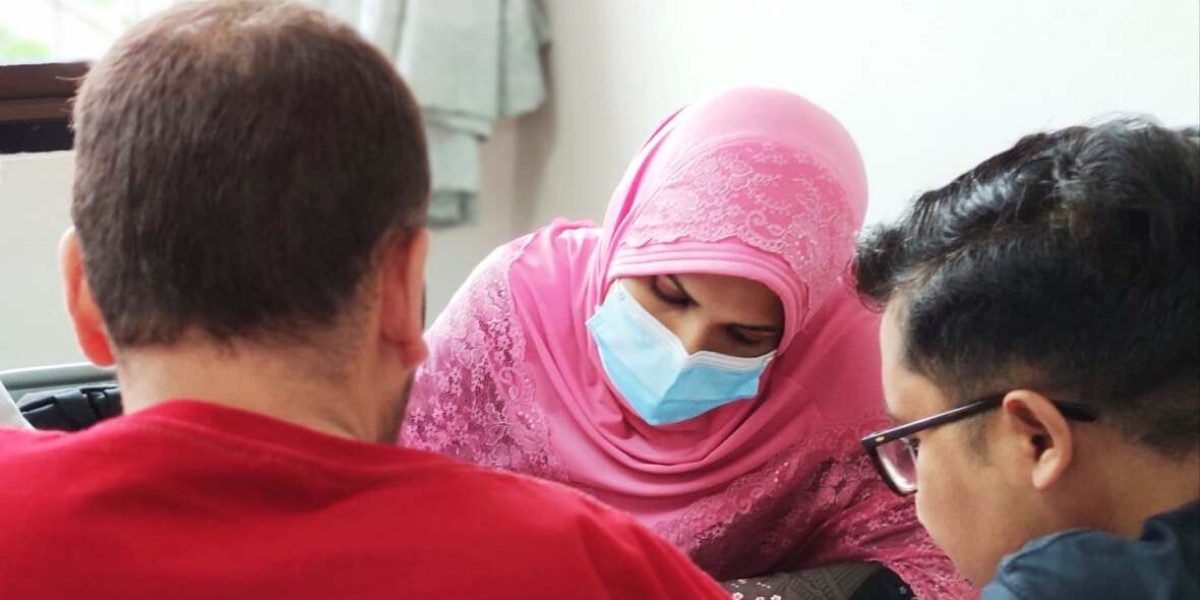Teaching Program Sparks Hope for Refugees in Thailand
28 November 2023|Chloe Gunther

In Bangkok, Thailand, Jesuit Refugee Service’s Urban Education Project (UEP) hosts various educational and vocational training opportunities for refugees, including English and Thai language courses, and Digital IT courses.
Neelam, a JRS UEP graduate, now teaches two different English classes with JRS. She recently sat down to talk about her experience, from the challenges of fleeing home to how she creates a welcoming environment in her classroom.
Neelam, along with her mom, dad, four sisters, two brothers, in-laws, nieces, and nephews, were forced to flee Pakistan due to religious persecution and arrived in Thailand ten years ago. Neelam was just 19 years old when she and her family realized they had to flee to save their lives.
“It is a good place,” Neelam said, speaking about her initial reaction to Thailand. She reflected on the freedom she feels now. “Everything changed, totally, I am more independent, and better mentally.”
The road to getting where she is today was not easy. When Neelam arrived in Thailand, she and her siblings were arrested and held in immigration detention, where officials kept them for five years.
Before the detention center, Neelam had several dreams and aspirations. “I wanted to be a doctor or a pilot,” she said, smiling at the memory.
“I have always been more introverted and shy,” Neelam said. “But when I got out of detention, I realized what I really wanted was to become a better communicator.”
In Thailand, refugees are not able to easily access a quality education in public or private schools, so Neelam sought out other ways to continue nourishing her intellect.
“We love learning,” Neelam said about her family. So, she turned to her older sister who told her about the different educational opportunities offered by the JRS center in Bangkok.
She began taking English classes with JRS and was inspired by her teachers. “They were my role models; their passion for teaching was like a cure.”
After Neelam graduated each level of the English language program, she started shadowing her role models to learn how she could become a teacher as well.
Today, Neelam teaches over thirty students. “I am enjoying it a lot,” she said, “the friendly environment keeps me alive.”
Most of her students are refugees from Pakistan, Somalia, Vietnam, and Myanmar. She said her biggest daily challenge is understanding one another’s accents.
The teaching program also fosters growth in leadership skills and in financial stability. “With the help of UEP, I can make good money to survive in Thailand as a refugee, which is also a great financial support to my family,” Neelam said.
A key component of the JRS UEP is the incorporation of Social and Emotional Learning (SEL) into the curriculum. This specialized education helps the students cope with and process the challenging events they have experienced.
“Social Emotional Learning helps my students think more about how they treat others, how they handle their emotions, and how they can tackle different situations,” Neelam said.
She described the difficulty of concurrently trying to improve intellectual skills while also trying to heal yourself from the mental toll of displacement. “When they are not mentally fit, they cannot learn,” she said.
She has taken specific trainings on how to better integrate SEL in her classroom. She often will begin the class by having the students pair up and talk about how they are doing. “Some of the students do not have many people they can talk to about their experiences, this helps them feel less alone.”
Other days, Neelam will begin class with a game to get the students brains and bodies moving. “This helps them feel more energized and refreshed…no more sleeping,” Neelam laughed. “Different activities and sports daily really nourishes not only the body but the mind.”
In reflecting on her future goals, Neelam said: “I want to find a safe space to continue becoming a teacher.” She is also particularly hopeful about her students and their work in SEL. “I am excited to see them keep improving, academically and mentally.”



